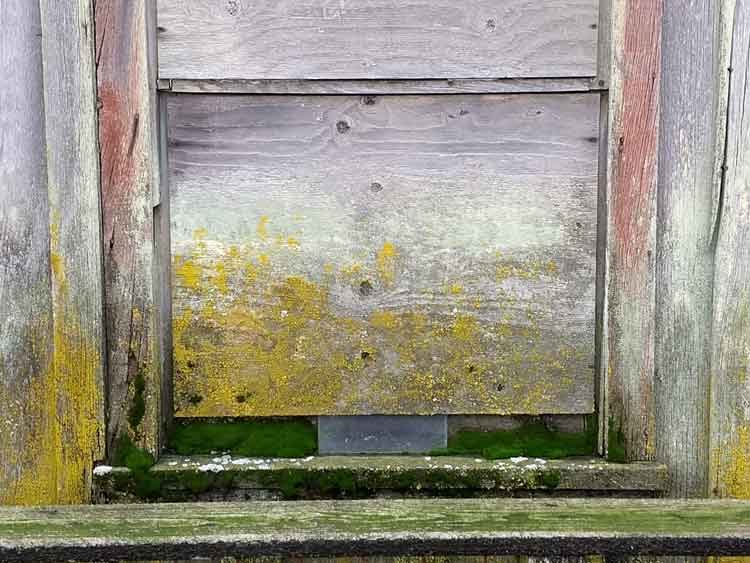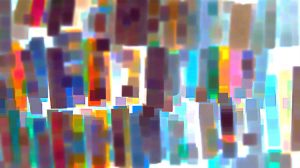
em
周阳春 / Zhou Yangchun
In the world of her dreams she stands at the ferry
without boats or before she can finish the exam
time is up Most times are defective products bleakness and emptiness
In the mountains at midnight she is left alone no one to turn to for help
She describes to me these scenes when she screams in her dreams Lamp light
brightens her face after her screaming relaxed and open
without the sinking silence or daytime tension In her dreams
she finds vast desolate wilderness she has to cry out she’s frightened
she screams … then wakes up to face in a crowded dorm of
twelve her bewildered co-workers
She apologizes to them saying in her body
hides a demon who curls up quietly during the day
but tortures her at night Her body is not used to
Twelve hours of labor at the electronics factory Fatigue
has become her only word of expression On the assembly line
her body is stiff and clumsy her joints ache
her fingers are heavy like machines In her back
legs waist she has lost control of the indescribable pain
pressing her body like a rock She must release from
her body an open field to allow herself to shout a beast
running out of her sleep This 17-year-old girl from Hunan
screams as if a boulder oppresses her In her sleep
her screams buried deep in her blood burst out
shaking the whole dorm Between her breathing and screams
I insomniac feel the oppression wrapped in the body
of a silent female migrant worker Her screams pierce
this hasty industrial age like a shout of protest
or the hidden moving matter in her veins
We still complain about how her screams broke our
beautiful dreams and her innocent body and lost gaze
Her screams in her dreams are this industrial epoch’s slow
hidden pains accumulating and exploding
(Female Migrant Workers: An Archive, Huacheng chuban she, 2012, 173–74)
旭容 / Xurong
Out of its futility life breads countless illusions
Even in the face of death and gloomy failures
I’m full of resplendent respect for life
It’s life that allows me to witness the strangest scenes on earth
I read the fate of these women or mine
Our bodies and souls eaten hollow by industry we
have lost ourselves too soon being dissolved by reality
only illness broken fingers wounds retain remnants of our era’s memories
As I write down these lines your pale face
reveals your frailty dizziness palpitations your breathing
labored You’ve gradually got used to what the industrial age brings
diseases pains glues benzene … entangled in the veins
Bodily pains are not as frightening as the sickness of society
Countless people who share your fate don’t know
the root cause of their illnesses They leave others’ cities to return to their villages
suffering ailments dying in silence becoming part of the voiceless
Industry is still displaying its own vain landscape in its own way
society still intoxicated with inexplicable prosperity You drag
your ailing body from the factory to the Occupational Disease Appraisal Center
to the Environmental Protection Center to the Department of Labor You endure
both social and bodily illnesses Tablets of medicine
flowing in your blood strangle the throat of your sickness for the time being
Social malady continues to rot from one canker
to another making you see more clearly
the truths of life True these outrageous
ailments are too real to speak of but you must
find their root cause I see in your lonely gaze
the glint of honest There’s too much pain we mustn’t continue to
endure its infliction blindly “So many people died without their occupational
illnesses appraised”
It’s more difficult than “the arduous paths to Shu”1 We are both from Shu,
experiencing the tortuous
cliffhangers of our fate from “off the docket” to “thoracotomy for lung
examination”2
I am filled with uncontrollable pain and rage….
(Female Migrant Workers: An Archive, Huacheng chuben she, 2012, 114 –15)
1 “蜀道难” This phrase—“the arduous paths to Shu”—is from a poem “Shudao nan” /(“Difficulty Paths to Shu”) by the Tang poet Libai. It refers to the extremely arduous paths from the ancient city Changan (present day Xian) in Shanxi Province to Shu (the alias of Xichan Province).
2 “开胸验肺” /“thoracotomy for lung examination” alludes to the extreme difficulties migrant workers encounter in having their occupational diseases appraised. The speakers refers to a widely publicized case of a migrant worker from Henan, Zhang Haizhao, who was diagnosed by several hospitals as suffering from pneumoconiosis. However, because those hospitals were not officially established by law as occupational disease appraisal institutions, the diagnosis was “useless.” His factory refused to provide him with documents of evidence. . Eventually he requested to have “thoracotomy” to prove his case. This incident is commonly referred to as “thoracotomy for lung examination”.
胡志敏 / Hu Zhimin
These years I am immersed in an immense era
feeling weak and frail allowing youthful life to be
covered by gloomy negations and ignorance
She died with the wounds of the times
with her three brothers and parents
who quarreled over her compensation Her corpse no one cares
no one mourns no one weeps for
only the icy cold figure of her reparation keeps her company
Hu Zhimin: twenty-three died of alcohol poisoning
I still have vivid memories of her
my co-worker who became a prostitute
at a hotel her innocent smiles loud voice
worldly experience She told me she had seen
too many so-called truths of life standing
on the threshold of reality such as desires and flesh
She was never ashamed of talking about her occupation
or her plans for life Many young women
from her home village entered this ancient profession
the newly married or sisters or aunts and sister-in-laws
leave together for Nanjing or Guangdong…
At hair salons in dim rooms she was beautiful
At hotels high-end places her face showed
happiness… We seldom saw each other we had the
same background yet belonged to two different
worlds In this city in this moment
two people met by chance in life then parted
each going her own way in a hurry
not knowing what fate would bring “She is dead!”
said a countryman of hers to me and described
the scene of her death saying how much money she had sent home
how wonderful her family’s newly-built house how her brothers used
the money she’d earned with her flesh bought a house and set up shop
in a small town
saying after her death her brothers didn’t even bring
her ashes home to be buried at their ancestral tomb
because she sold her flesh filth it would be bad for the family feng shui
(Women Migrant Workers: An Archive, Huacheng chuben she, 2012, 167–77)
铁鸟 / Iron Bird
Time is like a grey iron bird fluttering against the window,
Moonlight treading on distant memories saunters into my room.
Mysterious reticent frost scatters, white seeds covering the ground
Have grown into tranquil trees, standing in the North,
Their leaves falling. I am in the South, looking into the distance, those happy times
Restored in dreams. The iron bird disappears into silence.
Those made-up faces flash past in-between the trees in the North,
Those imaginary loves of mine, each resembles
A grey iron bird, flapping its wings.
(Collected Poems by Zheng Xiaoqiong, Huacheng chuben she, 2008, 30.)
火车 / Train
I’ve collected in my body a vast wilderness, a train
is running over it, autumn steeped in deep
cool twilight. I follow the train,
restlessly migrating, planting in the open fields a thousand hawthorn trees.
Their white crowns and scarlet fruit show benevolence
and peace. I know fate is like endless hills, rivers, and plains
or a meandering river, creeping low behind the train.
Atop hills near and far stand ragged trees, their unreal, imperturbable shadows
move behind the train, one, two … standing on boundless ashen fields.
I say to the trees, those are my friends, my family.
(Jute Ridge, Changzheng chuban she, 2006, p. 52)
出租房 / A Rental Room
The sound of wind from the old ceiling fan is dying down
fishy smell of the sea is blown here slowly from the shore, brackish lives
line up, refilling this book, these poems, curtains…
their dim, shrinking heads are
like the dry, lusterless gaze of an unemployed person
In the iron pot the quiet water is finally boiling, a scalding mess
a black lock, golden instant noodles, a bow, a basin
a sprig of freshly washed green onion—the only greenness left of life
(Jute Ridge, Changzheng chuban she, 2006, 17)





Leave a Reply